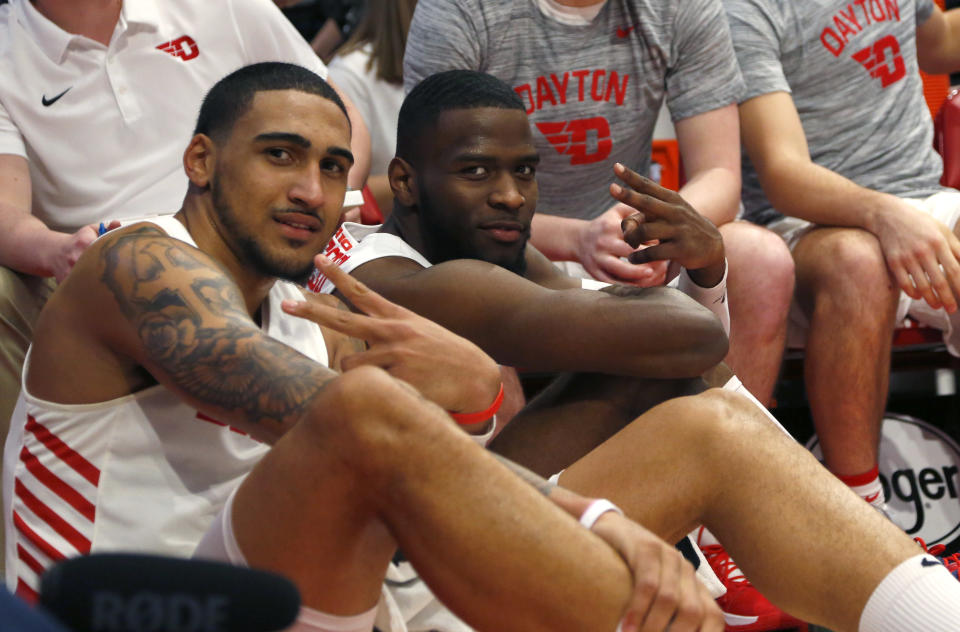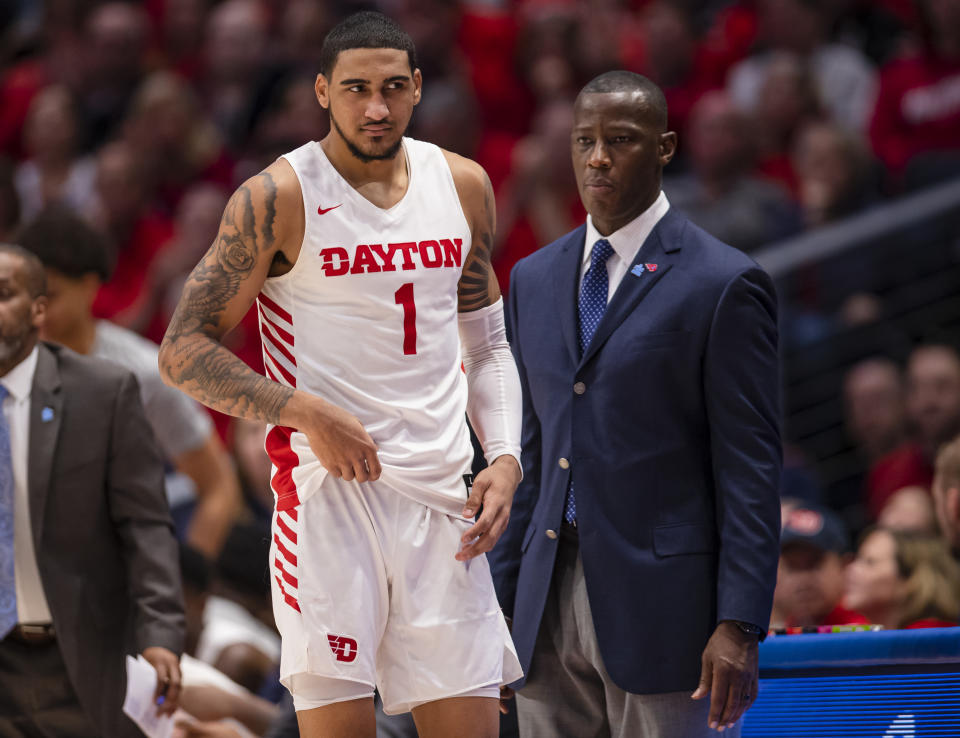How Dayton arrived among college basketball's elite: 'We can go win a national championship'

AMHERST, Mass. – Dayton is racing toward a historic season, redefining generational standards for its own storied program and conjuring memories of some of the greatest teams in Atlantic 10 history.
Dayton star Obi Toppin has emerged as college basketball’s viral sensation – think Zion lite – in soaring from virtual obscurity to a lottery pick amid an endless hailstorm of dunks. His roommate, Jalen Crutcher, has surged from an overlooked recruit in his hometown of Memphis to a legitimate NBA prospect.
They’ve combined to put No. 5 Dayton on target for the highest NCAA tournament seed in school history and the Atlantic 10’s highest-seeded team since the Jameer Nelson-led Saint Joseph’s squad of 2004. That team snared a No. 1 seed after an undefeated regular season. This Dayton team is 23-2 with only a pair of overtime losses to Colorado and Kansas.
Dayton’s 14-game win streak is its longest since the 1957-58 season. And the Tao of this Dayton team – overlooked players, an under-recruited star and a coach bouncing back from being fired – was summed up perfectly by third-year coach Anthony Grant this weekend: “How long does it take to be an overnight success?”
Grant brings a professor’s demeanor, an accountant’s pragmatism and an allergy to hyperbole to the sideline. He’s gone from star assistant to Billy Donovan at Florida to upsetting Duke in the NCAA tournament as head coach at VCU to getting dismissed after six uneven seasons at Alabama. After a two-year tour as an NBA assistant, he’s remained one of the rare college basketball coaches who vigorously avoids self-promotion. His former colleague at Florida, John Pelphrey, sums up Grant succinctly: “Anthony isn’t going to out-tweet anybody.”
Grant’s question about overnight success cuts to the core of both the story of Grant and this particular Dayton supernova, as both have long been preparing for this moment. No one else was ready for them.
As casual sports fans turn to college basketball and ask how Dayton found itself alongside familiar names like Gonzaga, Kansas and Duke in the rankings, Grant knows that this season isn’t actually an overnight success. It’s a summation of collective work, development and journeys – an arrival born of no one thinking they’d yet arrived.
Can Dayton win the national title? You’d have gotten crooked looks if you mentioned that at Atlantic 10 media day after the Flyers were picked third in the league. But the record, résumé and results would indicate that it can. Dayton’s losses to the Jayhawks and Buffaloes on neutral floors are better than its wins. But the Flyers have beaten a smattering of decent teams – Virginia Tech, Saint Mary’s, Richmond and Rhode Island among them – and are 12-0 in league play. “We feel like we can go win a national championship,” Crutcher said. “That’s what we talk about a lot.”
That’s where Grant, a man with a perpetual poker face, wants to hit pause. He understands his players’ ambition but is far more concerned about the present. His past offers a window into his worldview.
Over the phone last week, Oklahoma City Thunder coach Billy Donovan – who has been Grant’s boss at Marshall, Florida and with the Thunder – cackles through story after story about his old friend in his distinct Long Island accent. He knows Grant is focused only on what’s in front of him because that’s the only way he’s ever looked.
Grant would drive on recruiting trips while working for Donovan at Marshall in the mid-1990s. Donovan would be in the passenger seat, look over and see that Grant’s eyes were squinted so tight locked in on the road that he worried Grant was asleep.
“I called him Slits,” Donovan said. “I’d say, ‘I have to put toothpicks in your eyes. They’re like little slits. Can you even see out the windshield?’”

The reality for Grant was that his career path was locked in on linear success — until it suddenly wasn’t. Grant evoked the “overnight success” line as a way to explain what he’s learned along the way. He played for Hall of Famer Don Donoher at Dayton, coached for the legendary Shakey Rodriguez at Miami Senior High School and then Dan Hipsher at Stetson. He latched on with Donovan at Marshall in 1994 and fast tracked to a high-end career.
After taking over at VCU in 2006, Grant’s three seasons in Richmond included three regular season titles and two NCAA appearances. Grant’s 2007 VCU team upset No. 6 seed Duke in the NCAA tournament and the 2009 team lost by a point to No. 6 UCLA. The three regular season titles were three more than Shaka Smart won in six seasons at VCU.
He earned a bigger job at Alabama, where he made one NCAA tournament in six years, won more than 20 games three times and never could accumulate the talent to be a consistent factor in the SEC. “I’ve got a small rear-view mirror,” Grant said when asked about lessons learned.
Then he vaulted to the Thunder and a return to Donovan’s side, but any notion that the NBA transformed Grant for this head coaching opportunity at Dayton is brushed away. Did the NBA shape Grant’s views on things like analytics, shot selection and defensive coverages? Of course. The outlandish statistic that defines this Dayton season is that they’ve hit 62.2 percent of their two-point shots. To put that in proper context, that’s more than four percent better than Gonzaga’s 57.8 percent, which is second best in the country.
Grant didn’t find pixie dust or magic sets in the NBA, but it did help refine his offense. Dayton is the collegiate version of a fever dream of Rockets GM Daryl Morey, as less than five percent of the teams’ shots come between the paint and 3-point line. “I just think from an offensive standpoint, his team is so efficient,” UMass coach Matt McCall told Yahoo Sports. “They know what they’re running. They don’t make it more complicated than it needs to be. They’re really, really good at what they run.”
And everything runs easier with great players. Toppin’s 83 dunks will spike anyone’s two-point percentages, as the 6-foot-9 forward from Brooklyn has emerged as national player of the year candidate while averaging 19.7 points per game. Toppin’s game is made for the flash of the Instagram era, but his success didn’t happen in an instant. Instead, he’s emblematic of what stars in college basketball will look like in the future — overlooked, under-recruited and only rising because of a redshirt season and development through old-fashioned hard work.
Crutcher was supposed to go with McCall to Chattanooga but flipped to Dayton when McCall got the UMass job in April of 2017. He’s a smooth 6-foot-1 junior who does everything well – 14.7 points per game, hits 42 percent from 3-point range and runs the team with an aura of confidence.
They’re complemented by enough old and steady players — an amazing eight Flyers are listed as having taken redshirt years — that nine players got double-digit minutes in the relatively tight win over UMass. Rodney Chatman is a 6-foot-1 redshirt junior who is a secondary ball-handler; Trey Landers is a 6-foot-5 wing who averages 10.8 points per game; and sixth man Ibi Watson, a 6-foot-5 redshirt junior, is considered a sixth starter whose 10.6 ppg are instant offense.
They’re all tied together by the callouses inherent to rejection, doubt and adversity. “We talk a lot about this,” Crutcher said of he and Toppin. “We really weren’t highly recruited for this level. A lot of people say that I couldn’t be doing this at this level. I couldn’t play at this level.”
Collectively, Dayton is aiming toward levels it hasn’t achieved in generations, as Donoher took them to the national title game in 1967. Dayton lost to UCLA, like everyone else did in that era.
For now, though, Grant’s task is taking this overnight sensation and reminding them of the years of work that’s been required to become one. “We haven’t done anything yet,” Grant told Yahoo Sports this weekend. “They don’t give out trophies in early February.”
More from Yahoo Sports:

